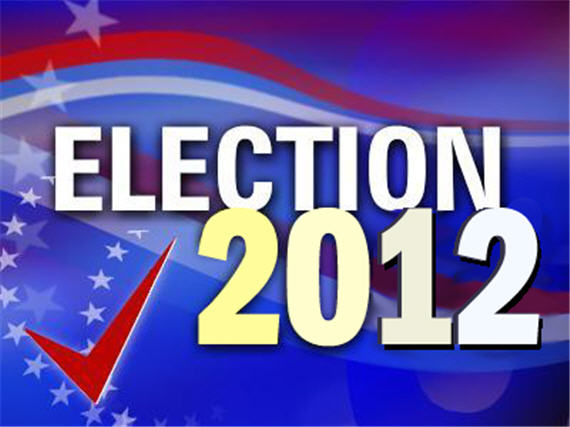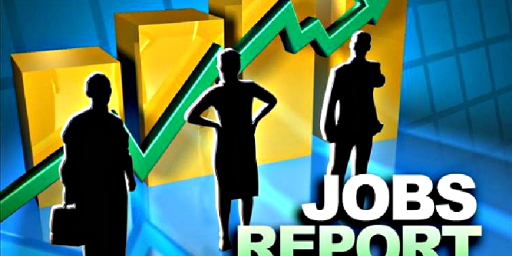7.7% Unemployment On Election Day 2012?
The Wall Street Journal today forecasts that the unemployment rate will be at 7.7% when Barack Obama faces re-election on November 8, 2012:
The U.S. jobless rate will be 7.7% in November 2012, the highest level for a presidential election month since Jimmy Carter defeated Gerald Ford in 1976, according to the average forecast of economists in the latest Wall Street Journal survey.
That rate is well below the 8.9% reported by the Labor Department for February, but still remains high as economists expect job gains to come slowly. “The labor market is a scar that will be slow to fade,” said Sean M. Snaith of the University of Central Florida.
On average, the 54 respondents—not all of whom answer every question—forecast the jobless rate will be 8.8% in June and 8.4% in December of 2011. They forecast the U.S. economy will add about 190,000 jobs a month over the next year—an improvement from the depressed level of job creation so far in this recovery, but still too low to bring the unemployment rate down quickly.
While the 7.7% rate in November 2012 would be the highest in seven presidential election cycles, analysts point out that it is often the overall trend—rather than the level of joblessness—that determines an incumbent’s fate. President Carter was defeated in 1980 by Ronald Reagan when the unemployment rate was 7.5%, lower than the level when he was elected but up from 5.6% earlier in his term. Meanwhile, President Reagan was re-elected in 1984 with the rate at 7.2%, but that was down sharply from the peak of 10.8% recorded in 1982.
The early 1980s recovery moved at a much faster pace than the current upturn, especially in the job market. The 1984 election was held two years after unemployment hit its cyclical peak, and had already fallen by 3.6 percentage points. By contrast, the most recent peak in the jobless rate was at 10.1% in October 2009, and if economists are correct, that would mean a decline of just 2.4 percentage points in more than three years.
Most economists don’t expect the unemployment rate to return to 5.5%—the level generally considered to reflect full employment—until 2015 at the earliest.
Assuming these forecasts end up being close to correct, then President Obama will, at least in some sense be vulnerable next year.




Between this and $5 gas, he is going to have fun getting re-elected.
Unemployment is “good news” for Republicans!
I can’t believe that many people will leave the labor force (since that’s the only way that the unemployment rate would go down that far in 18 months).
On a related note this morning I read a forecast from a serious, well-respected analyst who’s predicting a 5000 DOW and a major war in 2012.
Everytime I see one of these posts saying how incredibly tough Obama will be to beat, I am never convinced. The economy will not be great, wars will still be continuing, the healthcare bill will not be significantly more popular…. I mean, I’d still give him greater than 50% chances of winning, but not greater than 60.
The price of oil is the known unknown here. High prices mean continued unemployment and stagnated growth.
If oil costs Obama the election we can expect the next president to do what none before have done, formulate a real energy policy.
Funny, but the conventional wisdom that I have heard recently, many times, is that the rate needs to be 8% or less for Obama to be highly likely to be reelectted. So now the WSJ comes out with an attempt to set the expectation bar down at 7.7%. Wonder why they would do something like that?
“II can’t believe that many people will leave the labor force (“since that’s the only way that the unemployment rate would go down that far in 18 months).”
The average unemployment rate in 1983 was 9.6%. For 1984 it was 7.5%. Was that a result of people fleeing the labor force?
There are several differences between your example and present circumstances. We were in a completely different phase of the recovery at that point than we are now. The recovery has now been going on about 20 months. If the recession of the early 80s is your model, we should have been seeing much stronger employment growth already than we are.
Additionally, we haven’t seen sustained employment growth at the rate that would be required for more than a decade.
If your point is that precedent suggests it’s possible, then, yes, you’re correct. Possible isn’t the same as likely and I don’t believe the WSJ scenario is likely.
If you look at long term trends of some thirty years, then the turnaround for the unemployment happened under Bush. Going back to the “guns and butter” of LBJ in which inflation was created, it was increasing years of higher inflation, interest rates, and unemployment, until the early 80’s as the fed cracked inflation and interest rates and unemployment came down. And unemployment continued to come down into the middle of the Bush administration, but the “guns and butter” of the Bush administration (deficits, debt, war, and ignorance of our economy) and globalization has reversed the twenty five year run of lower unemployment.
All of the stimulus that we can use to go forward is used up. Years of tax cuts but our jobs went overseas. Years of lower and lower interest rates have lost their stimulus effect. Years of deficits and debt. Years of total mismanagement, failed ideologies, and ignorance has set our country on a rough course. And we have done little to correct the situation. The pundits have continually given wrong assumptions and we have not prepared for a globalized world. And I still say it will take some twenty years to correct-if we get it right.
We can pass through different presidents and parties, but the course of unemployment to get back down to 5% will take a long time. People are leaving the workforce as their are new demands for higher trained workers. And conditions have developed (like closed factories) in which it will be impossible to be employed for the older generation. We have not experienced in our lifetimes the flood of 2 billion cheap laborers from China to Egypt. People are demanding jobs and there are no jobs to go to. Our country “owned” the world in production and that has changed. We still need a catalyst that will support our middle class, lift our country and the worlds economy on jobs. And the pickings are slim.
I think it is eminently possible,. Just consider the amount of capital that is in the hands of investors who seem to be waiting for some cue to get in the game.; Any changing circumstance in the next year and a half could goose a significantly accelerated expansion.